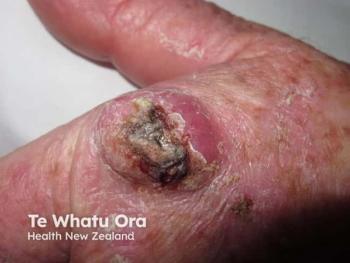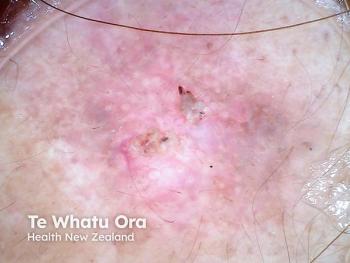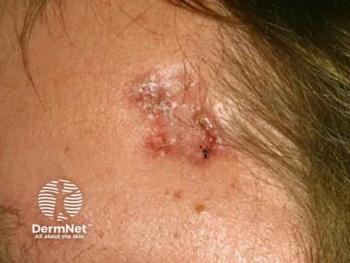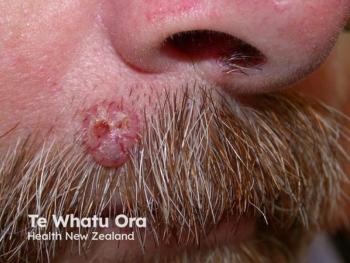
- Dermatology Times, December 2018 (Vol. 39, No. 12)
- Volume 39
- Issue 12
Mortality high in squamous cell carcinoma in hidradenitis suppurativa
Squamous cell carcinoma in hidradenitis suppurativa is rare, but mortality is high, according to Mayo Clinic researchers reporting at the American Society for Dermatologic Surgery annual meeting last week in Phoenix.
PHOENIXâIncidence of squamous cell carcinoma in hidradenitis suppurativa is very rare, with fewer than 100 cases in published records. However, the mortality rate is very high, so it must be treated aggressively.
“Though rare, invasive SCC arising in HS carries a very high risk of death. It is re-assuring to note that it is infrequent, but if detected it must be treated very aggressively,” said John Kohorst, M.D., in a talk given at the American Society for Dermatologic Surgery annual meeting last week in Phoenix.
Dr. Kohorst, of Mayo Clinic in Rochester, Minn., undertook a study to calculate the incidence within one county in Minnesota over a period of 37 years, from 1976 through 2013. Previously, the only epidemiological data on occurrence was from a 2001 review of the Swedish National Cancer registry of hospitalized patients over a 32-year period, which identified five patients with the condition out of 2,119 patients with hidradenitis suppurativa.
He and his colleagues examined clinical characteristics, pathologic findings, and postoperative outcomes, and assessed whether HPV could be involved in the pathogenesis, since a previous study detected high risk of human papilloma virus (HPV) in such cases. They found 12 patients who were identified through medical records and the Rochester epidemiology project, of which 9 were men, and 11 were of Caucasian descent.
All cases involved gluteal, perianal, or perineal skin. Seven out of 12 patients had post-operative squamous cell carcinoma recurrence, which caused death in these patients, despite being treated with surgical excision, and aggressive surgical and radiotherapeutic intervention. Three other patients died of unknown causes, but it was not associated with high-risk or low-risk HPV, so unlike the previous study, the Mayo researchers found no link to HPV. They concluded that this condition was more common in men with chronic gluteal, perianal and perineal hidradenitis suppurativa.
“This study is relevant now and in the future, because of the very high mortality rate of SCC and also because of newer HPV observations in SCC. HPV has been noted especially recently to occur in several subtypes of SCC such as verrucous SCC, as well as SCC locations - oral, periungal/digital, and cervical. Our study, however, did not find an association with HPV infection, as was reported in a previous series,” Dr. Kohorst said. “
The researchers noted that mean duration of HS before SCC development was 28.5 years (with a range of 15-53 years).
Although HS is more commonly prevalent in women than in men, Dr. Kohorst said disease severity has been correlated with older age, male sex, and smoking history. In their study of 590 patients, most patients with surgical disease were men, at 57 percent. And nine out of twelve patients with SCC in HS were men, which he said concurs with the data from other published reports where almost all patients were men.
REFERENCE
Kohorst, J. (2018). American Society of Dermatologic Surgery, Phoenix, Arizona. October 11, 2018. Utility of Staging PET-CT in Patients with Stage II Melanoma. Poster # 9
Articles in this issue
about 7 years ago
Presentation and management of the neuropathic itchabout 7 years ago
Inadequately controlled atopic dermatitisabout 7 years ago
European data protection regulation impacts U.S. patient privacyabout 7 years ago
Market competition impacts topical generic medication pricingabout 7 years ago
High efficacy shown in self-inject psoriasis biologicabout 7 years ago
First approved biologic in dermatology to carry suffixabout 7 years ago
Steps to mitigate cyber riskabout 7 years ago
Dr. Reddy’s sells Cloderm to EPI Healthabout 7 years ago
ODAC returns to OrlandoNewsletter
Like what you’re reading? Subscribe to Dermatology Times for weekly updates on therapies, innovations, and real-world practice tips.












